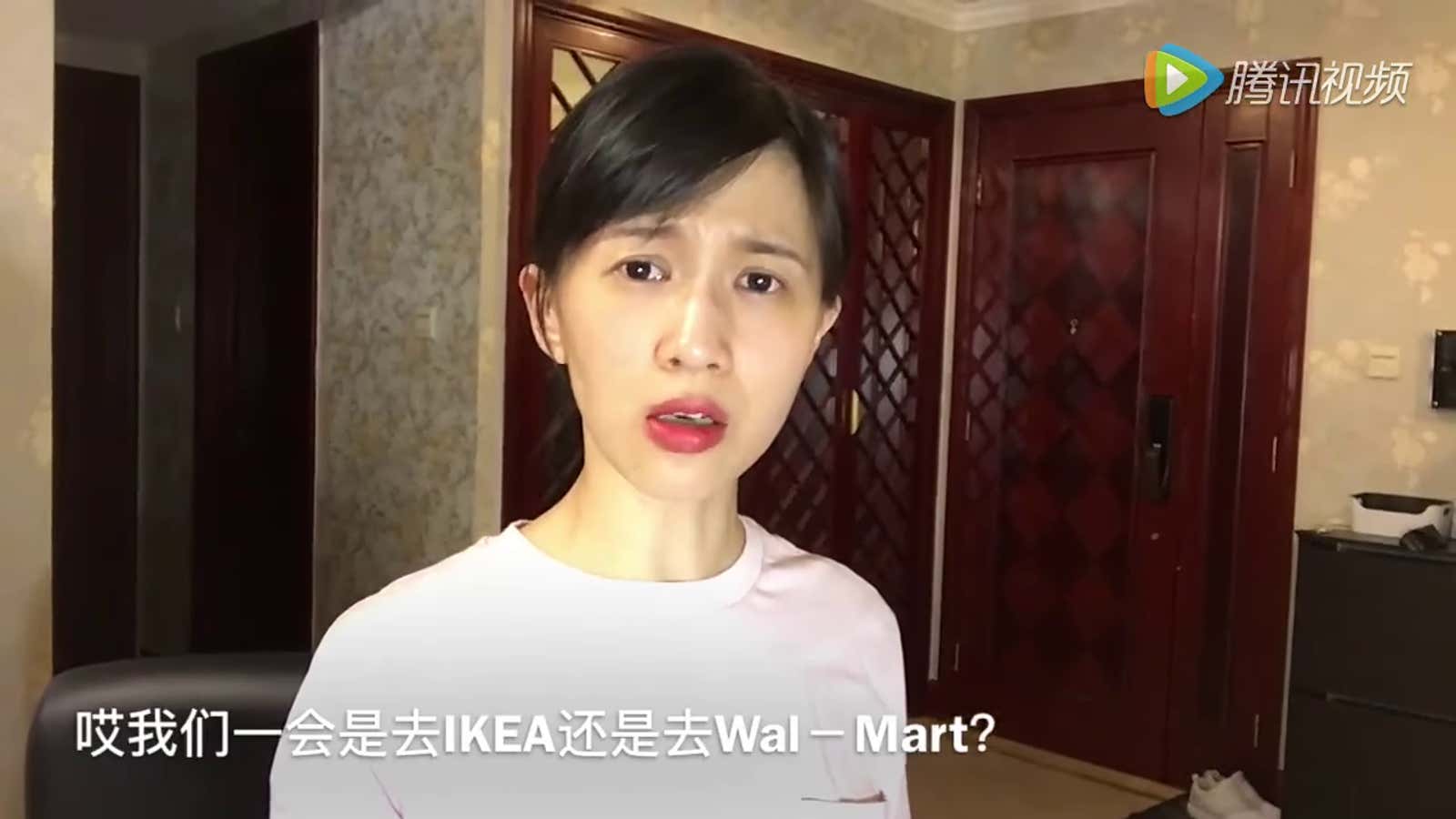The Chinese government doesn’t like it when English words sneak their way into its ancient language. Government censors have tried to ban English words in the media, even in cases where there is no obvious Chinese equivalent, like “wi-fi” and “iPhone.”
But the government can’t really censor how people talk, and people in China already use English a lot. Allow Papi Jiang—a popular Chinese video blogger known for her artificially speedy and high-pitched comedic videos—to explain.
Her video (in Chinese) lays out eight different ways that English appears in Chinese speech. In part, it’s an entertaining look at how Chinese speakers drop English terms to sound worldly or sophisticated, much like Americans or Brits who always do their best French accents on the word croissant. But it also reveals how common English is becoming—so much so, that special new grammatical structures have formed in the Chinese language in order to incorporate English.
“English has already become a part of Chinese people’s daily lives,” says Papi in her intro. Here are the structures:
#1: Doubling emphasis
Papi explains: “Say what you want in Chinese once. Then take the main point, translate it into English, and say it again. This creates an emphasizing effect. Here is an example example.”
Examples:
Chinese: 他只会讲法语French啦
Pronunciation: tā zhǐ huì jiǎng fǎ yǔ French lā
English: He only speaks French French!天啊他这个人真的是难以置信unbelievable
tiān ā tā zhè ge rén zhēn de shì nán yǐ zhì xìn unbelievable
My god this person is unbelievable unbelievable
#2: Single emphasis
Papi explains: “Take the key words from a sentence and say them in English. This method is often used in foreign companies [based in China].”
Lucy, 这个case你来follow还OK吗?
Lucy, zhè ge case nǐ lái follow hái OK mǎ
Lucy, Ok for you to take/follow this case?
Deadline之前搞不定我fire掉你们整个team!
Deadline zhī qián gǎo bú dìng wǒ fire diào nǐ men zhěng gè team!
If this isn’t done on deadline, I’ll fire your whole team!
#3: Elementary English
Papi explains: “Take the absolute easiest, most basic English words, and use them in the most banal scenarios. This creates a cuteness effect, and displays your rudimentary knowledge of English.”
我们今晚去eat什么呀?
wǒ men jīn wǎn qù eat shén me ya?
What are we going to eat tonight?fruit里面我最喜欢apple
fruit lǐ miàn wǒ zuì xǐ huan apple
My favorite fruit is apple.
#4: Transition words
Papi explains: “Turn all of the linking words in your sentence into English. This makes your transition seem even more transitory.”
我很喜欢他啊, however他不喜欢我啊
wǒ hěn xǐ huan tā ā, however tā bù xǐ huan wǒ ā
I like him, however he doesn’t like me.Since大家这么辛苦了, what about 我们放个假?
Since dà jiā zhè me xīn kǔ le, what about wǒ men fàng gè jiǎ?
Since everybody’s working so hard, what about taking a holiday?
#5: High-level mood words (or modal particles)
Papi explains: “In the middle of Chinese, add the most fluent-sounding English mood words. It gives off the impression that you have lived abroad for many years.”
what’s up你干嘛?
what’s up nǐ gàn má?
what’s up, what are you doing?嗷~今天真的是倒霉死了, Bummer~
áo jīn tiān zhēn de shì dǎo méi sǐ le, bummer
Ugh, today is not my day, bummer
#6: High-end jargon-acronyms
Papi explains: “Use fancy English acronyms that refer to specialized jargon. This creates the effect that only specialists in this area will have any idea what you are talking about.”
B2B和B2C我们都做啊
B2B hé B2C wǒ men dū zuò ā
We do both B2B and B2C
LPL春季赛RNG和EDG是LCK水平
[Translators note: I think these acronyms are about League of Legends?]
#7: The original name
Papi explains: “The point here is to express the idea that, ‘Sorry, I don’t know the Chinese word for this.'”
hmmm相比Martini我觉得Vodka比较好喝
hmmm xiāng bǐ Martini wǒ jué de Vodfa bǐ jiào hǎo hē
hmmm I prefer vodka to a Martini什么LV?哦你说的是Louis Vuitton吧?
shén me LV? é nǐ shuì de shì Louis Vuitton bā?
What is LV? Oh, you must mean Louis Vuitton?
#8: Free-flowing mashup
Papi explains: “Seamlessly combine English and Chinese in perfect harmony, giving off an air of genius. Not everyone will get it.”
Would you please 好好想想 for one minute? 我做的everything都是为了us的future啊
Would you please think hard for one minute? Everything I do is for our future.
